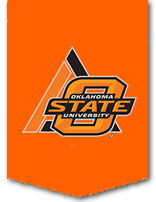FAPC event brings food industry issues to the forefront
By Mandy Gross
FAPC Communications Specialist
The Food & Agricultural Products Center on the Oklahoma State University campus recently held the second annual Charles B. Browning Lectureship Series at the FAPC to discuss issues related to the food industry in Oklahoma.
Rodney Holcomb, FAPC agribusiness economic specialist and chair of the series, said he was pleased with the outcome of the event.
“I was grateful we could get these industry leaders together to discuss issues relevant to both their individual operations and the food industry as a whole,” Holcomb said. “The opportunities to hear such detailed observations and interact with executives at this level are rare.”
Not only did the event include industry speakers, but also included a panel discussion with food industry executives regarding key issues facing Oklahoma’s value-added processors.
Rendering, workers’ compensation, hiring, transportation of product in rural communities, and insurance and liability in bigger cities were some of the issues of concern that were discussed during the event.
The speakers were John Bailey of Schwan’s Bakery, Stilwell, Okla.; Phil
Whitworth of Producer Cooperative Oil Mill, Oklahoma City; David Howard of Unitherm Food Systems, Bristow, Okla.; and keynote speaker John Bode.
Bailey is the director of manufacturing for Schwan’s Bakery and oversees 1100 employees. The plant produces pies, such as apple, pumpkin, pecan, custard, crème and meringue, and breaded vegetables, such as okra, squash, cauliflower, zucchini and cheese sticks.
During Bailey’s presentation, he praised the capabilities of the FAPC.
“This facility has latent, dormant potential that is not utilized by this state,” Bailey said.
Bailey said Schwan’s Bakery has used the FAPC on many occasions and encouraged others to take advantage of the center’s services.
“There are people here who have a wealth of knowledge who can help us,” he said. Whitworth explained the PCOM production plant crushes 200,000 tons of cottonseed per year and has a storage capacity of 150,000 tons.
Whitworth also explained that PCOM is working with the FAPC on several projects.
“We are really proud to work with the FAPC and OSU,” he said.
Some of the projects that PCOM is working on with the FAPC include a market line of lawn and garden products using cottonseed meal and hulls as potting mix; cottonseed meal as an organic, slow-release fertilizer; and cottonseed hulls as an organic mulch compost.
“What we would like to do is bag 20 percent of our product in the future,” Whitworth said.
During Howard’s presentation, he discussed some of the food safety equipment and processes produced by Unitherm Food Systems. Unitherm has worked closely with the FAPC and has provided about $2.5 million worth of equipment to the FAPC.
“We got involved with the FAPC in developing processes we could sell to the industry,”
Howard said.
Howard stressed that food safety sets companies apart from other companies.
“If companies invest in the food safety equipment, their companies will be safer,” he said. “The companies that have bought Unitherm’s food safety equipment say their companies run smoother.”
During Bode’s keynote presentation, he discussed the challenges with regulating food. He identified three regulatory challenges that currently affect the food industry: market forces, government forces and Mother Nature.
Bode defined market forces as low prices, desire for fresh products and more product information.
“There is an interest in a greater perceived quality,” he said. “Also, America is eating more produce. That is why we have more food safety concerns in produce.”
Bode discussed some examples of governmental forces affecting the regulation of food, which include risk reduction pressure, shifting political environment, state initiatives and tight funding for regulatory agencies.
Bode identified Mother Nature as emerging threats to food safety, such as bovine spongiform encephalopathy, Escherichia coli and Listeria.
Some of the future regulatory challenges facing the food industry include allergens, adulterants, labeling of allergens and trans fats, nutrition labeling, and health and nutrient content claims, Bode said.
The food industry is never stationary; it is always moving and changing, Holcomb said.
“Industry members have to be looking five years down the road and anticipating trends in both consumer demands and regulatory issues,” he said. “Mr. Bode gave us a good look into the crystal ball, and from the discussion it was enlightening to see how our industry members have started preparing for the future.”
- ### -
Oklahoma State University, U.S. Department of Agriculture, State and Local Governments Cooperating. The Oklahoma Cooperative Extension Service offers its programs to all eligible persons regardless of race, color, national origin, religion, sex, age, disability, or status as a veteran, and is an equal opportunity employer.

